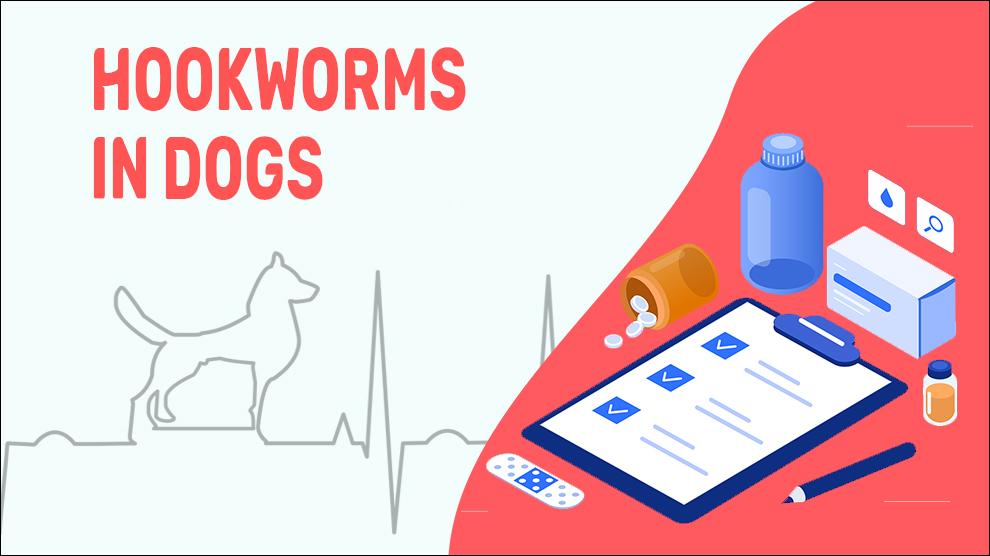Intestinal parasites are a severe problem for pups. In adult dogs, however, intestinal parasites are only occasionally fatal. There are several types of intestinal worms that cause problems in dogs. Hookworms (Ancylostoma species) are zoonotic, blood-sucking, intestinal nematodes that result in the development of anemia.
Hookworms get their names from the hook-like parts of the mouth used to clasp themselves to the mucosa of the intestinal wall. In about 8 days after infection, the dental structures would have grown to mature hookworms and clasp intestinal structures with their oral parts. They are very difficult to see with the naked eye as they are only (5-10 mm) long. With this tiny size, the amounts of blood they suck from the intestinal wall is unimaginable and they switch sucking sites every few hours. A horde of hookworms in the dog’s intestine can cause inflammation and a life-threatening reduction in the number of RBCs.
After the prepatent period (2 - 3 weeks) is over, hookworms pass millions of microscopic eggs in the infected dog’s feces. The eggs hatch the larvae and can remain dormant in the moist, sandy, shaded soil for even months. A dog gets infected when it unintentionally ingests hookworm larvae, usually by sniffing feces or grooming its feet in the contaminated soil.
Most ingested larvae will travel to the intestinal tract to complete their life cycle. Most of the larvae stay in the intestine, some burrow into the windpipe (trachea), some of the larvae may also move into the skin if the dog lies or walks on contaminated soil and some may move to the mammary gland where they get passed on to the offspring through the milk. The larvae get encysted and when the dogs cough up and swallow the larvae, they then migrate to the intestinal tract, where the encysted larvae become active to complete their life cycle.
Symptoms Of Hookworms
- Distended abdomen (belly).
- Diarrhea, with or without blood or mucus.
- Anemia
- Scooting
- Vomiting
- Dehydration / Malnutrition / Weight loss
- Decreased activity
- Lethargy and fatigue
- Poor coat appearance.
- Hair loss, severe itching
Treatment Options For Hookworms
- Deworming medication (anthelmintic) medications: Febantel, Fenbendazole, Moxidectin, Milbemycin oxime, and Pyrantel.
- Antibiotics
- Gastrointestinal medication
- Intravenous fluids
- Blood transfusion
- Immunosuppressive drugs
Home Remedies For Hookworms
Hookworm infections are never going to go away on their own. While intestinal parasites are treatable, however, keep in mind that the best way to protect your pets against parasites is to use parasite preventatives.
If you haven’t used any monthly parasite preventatives, discuss with your veterinarian to protect your pets and family from intestinal parasites.
Prevention Of Hookworms
- Preventive medication is provided monthly for dog worms.
- All puppies (more than 3 weeks of age) should be given initial treatments.
- Follow the annual dewormer protocol for dogs as suggested by your vet.
- Prompt detection (performing fecal tests 2 - 4 times yearly for adult dogs) and intervention in the form of a dewormer for dogs.
Affected Breeds Of Hookworms
Young Puppies, Puppies. There is no breed predisposition.
Additional Facts For Hookworms
- Causes:
- An adult dog gets parasites through eggs or spores in contaminated water, soil, food, or feces.
- Flea, tick, Mosquito bites, and ingestion.
- When comes in close contact with an infected dog.
- Puppies usually get intestinal parasites from their mother through the placenta (in utero) and during nursing.
- Types:
- Ancylostoma Caninum (tropical and subtropical areas of the world).
- Ancylostoma Braziliense (USA, Central, South America, and Africa).
- Uncinaria stenocephala (cooler regions).
- Mortality:
Hook works are only serious in puppies and in adult dogs - in weak, immunosuppressed, or in debilitated animals.
- Diagnosis:
- Complete blood profile and urinalysis.
- Stool Sample
- Cutaneous cytology - The skin sample from the dog is examined microscopically.
- Prognosis:
The prognosis for mild infestation after prompt treatment is usually good. Severe infestation drain out the dogs and they may take a longer time to recover.
To break the life cycle of the worms, most of the medications may be repeated once a month.
When To See A Vet
It’s better to set up an appointment with your veterinarian if you notice -
- Distended abdomen (belly).
- Diarrhea, with or without blood or mucus.
- Anemia
Food Suggestions For Hookworms
What to feed?
- Low-fat meats (Fats omega-6 : omega-3 ratio= 5:1).
- Protein - Lean chicken or turkey breast, lean beef, and Cooked fish (salmon, tuna).
- Pumpkin and Potatoes (pureed or canned).
- Probiotics (Goat's Milk, yogurt, kefir with live cultures, fermented vegetables).
- Green vegetables and leafy produce: Carrots, Beets, Kale, Spinach, Seaweed.
- Oats, Rice flour, Sweet potatoes, Watermelon, and Banana.
Conclusion
Hookworm parasites are infectious to humans and other animals. Until your pet is dewormed for parasites, your family may be at risk of zoonotic parasitic infections.
Hookworms mostly inhabit the GI tract and they are transmitted via eggs that are passed through the feces or larvae or spores in contaminated soil. This increases the chances of transmission to other dogs and kids due to inadvertent ingestion.

















